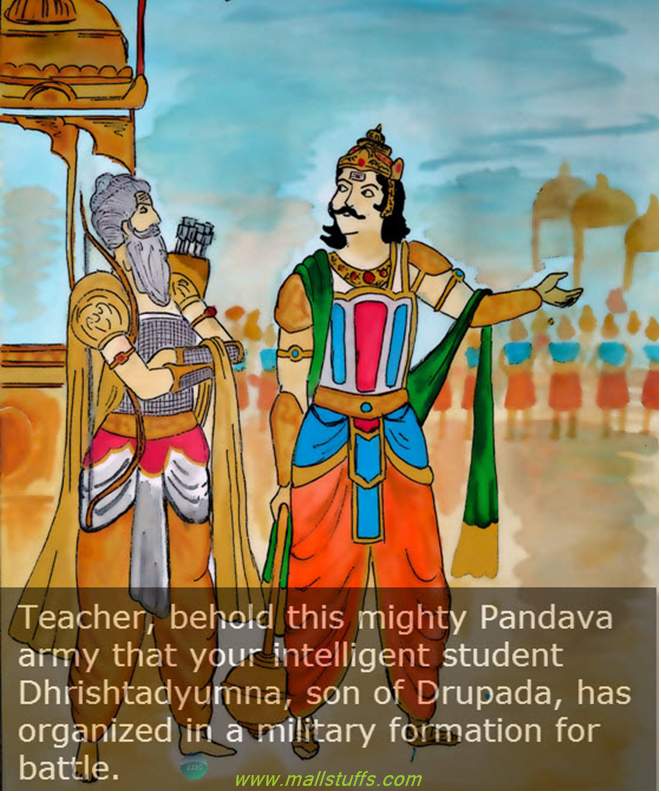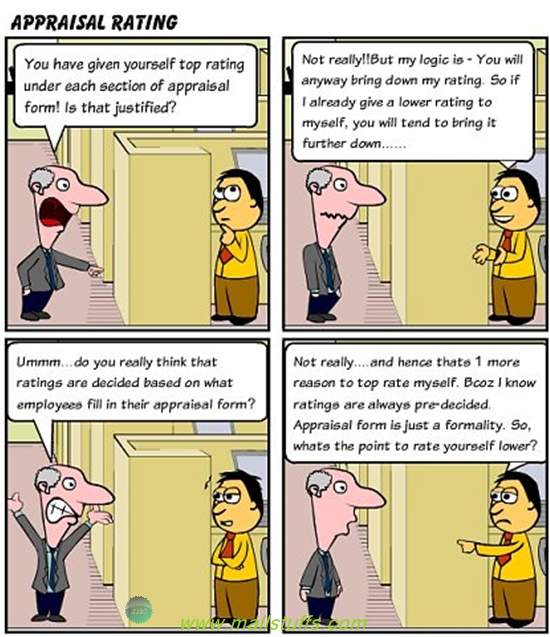
Bhagavad gita Chapter1, verse 3 english and hindi poetic translation with lessons
In the second verse of chapter 1, we saw how Duryodhana mind was engulfed with fear on seeing the mighty military formation of the pandavas and how he approached Dronacharya to motivate him to fight against the pandavas. In this verse, I will discuss on how Duryodhana encouraged Dronacharya to fight against the pandavas and his army commanders by reminding him his past mistakes and annihilating the feeling of compassion and mercy.
Original Sanskrit verse
पश्यैतां पाण्डुपुत्राणामाचार्य महतीं चमूम्।
व्यूढां द्रुपदपुत्रेण तव शिष्येण धीमता॥१-३॥
English Transliteration
pashyaitaam paanduputraanaamaachaarya mahatim chamoom |
vyoodham drupadaputrena tava shishyena dheemata || 3 ||
English translation:
Teacher, behold this mighty Pandava army that your intelligent student Dhrishtadyumna, son of Drupada, has organized in a military formation for battle.
Word to word translation
aachaarya: teacher
tava: your
dheemata: intelligent
shishyena: student
drupadaputrena: son of Drupada
vyoodham: organized in military formation
paanduputraanaam: of the Pandavas
etaam: this
mahatim: mighty
chamoom: army
pashya: see / behold

My Hindi poetic translation
ओ मेरे आदरणीय योद्धा गुरु
देखो उस विशाल पाण्डु सेना की ज़ोर
जिसे बनाया आपके प्रिय शिष्य ने
??????? <https://dict.hinkhoj.com/words/meaning-of-???????%20????-in-english.html> कर रहा आप की और
My English poetic translation:
O my revered warrior guru
See at mighty army of sons of pandu
Arranged precisely by your intelligent student
Fighting against you like an enemy agent
Lessons/messages from this verse
King should induce anger and hatred in those warriors who may revolt against his own army because of the affection for the relative warriors in the opposing army
At this point of time, duryodhan felt intuited that Dronacharya might pull out of the battle, out of the affection for his favorite student Arjuna and other pandava brothers. If dronacharya denies fighting the battle, than many soldiers from his army would also either pull out or would join the opposing pandava army. Furthermore, duryodhan felt that even if Dronacharya choose to fight against the pandavas to illustrate his loyalty to hastinapur kingdom, he might not fight like a true enemy warrior because of the affectionate love for the pandavas. Therefore to induce anger in the mind of Dronacharya, Duryodhana utter out loudly pasyaitam(Behold these) thereby suggesting that the pandavas are arrogant and deserve no mercy as they have disregarded their teacher and ignored his valuable teachings by leading out a vast army against own family members and revered ancestors like Bhisma pitamah.
How this point is applicable to software professionals (One example)
Here is a very important learning for managers which I have faced myself. In software industry, sometimes software professionals revolt against the managers or management because of bad appraisal, politics, personal conflict etc. Such professionals try to convince all his colleagues which may include lower-level managers to rebel against the upper management for the injustice done to him.

Personal conflict downgrades the morale of the employees
Such an act by lower-end professional, irrespective of whether his point is true or false, gives a very bad name to the management and company not only among the company employees but also among company clients, affiliates, partners, sponsor etc. So, as a responsible manager, it is very cruical to avoid any such revolt by professional working under you. In the case where the professional doesn’t negotiate or threaten to rebel, it is very necessary to ensure that no other colleague joins his rebellion by carefully boasting against the rebel thinking, actions and deeds.
Criticism and praise of your enemy should be very well balanced.
While Duryodhana started criticizing and insulting Pandavas, he anticipated Dronacharya to interrupt and speak in favor of the pandavas. So, before Dronacharya would speak out, Duryodhana cynically exclaims the excellence and intelligence of ministers in pandavas army. Duryodhana knew very well that if he keeps only criticizing than Dronacharya would doubt his plan and intention. So, he carefully jumbled his words to exhibit the flavor of criticism mixed beautifully with few words of praise. In this verse, he extols the intelligence of Dhristayumna, commander-in-chief of the pandavas army. In next verses, he glorifies the excellence of other ministers in both pandavas and kaurava army.
How this point is applicable to software professionals (One example)
In almost all software companies, managers have to treat most of the inferiors as an enemy during appraisal. This is because of the company rule that limits the role change or promotion to only few percentage of the total employee strength. Generally as a thumb role, only 3-5% of the total employees receive promotion. Most of the promotions (75%) doesn’t go to high performing candidates but to the candidate who engages in 24 hrs ass-licking of his manager. So, for the remaining 99% employees, irrespective of how good and excellent the candidate is in his role and work, managers have to play very well by adding certain amount of praise in criticism to avoid mutual conflict, attrition, revolt, exploitation etc. Managers also make sure that they don’t give any chance to the appraisee to refute his criticism and biased rating.

Real truth of appraisal ...Boss is always right
To get someone support, dwell deep into his history and manipulate the facts to suit your objective
Duryodhana pointed out the defects of Dronacharya by diverting his attention to the military army formation arranged by none other than his intelligent disciple Dhristayumna. Note that in this verse, Duryodhana doesn’t call Dhristayumna by his name, instead he calls him “drupada-putra”, meaning “son of king Drupada” thereby reminding Dronacharya of his friend-turned enemy King Drupada. Duryodhana tried to provoke anger by conveying the message that the Pandavas has purposely elected Dhrishtadyunma as commander in chief of their army to malign him for the insult he did to king Drupada.
Note:
King Drupada and Dronacharya were best friends as they were the students of sage bharadvaja but because of some misunderstandings, they later turned into bitter enemies. Dronacharya forced his student (pandavas) to defeat king drupada and grab half of his kingdom. Seeking revenge for the loss of his kingdom and subsequent insult by Dronacharya, king Drupada did a severe sacrifice to beget a son (Dhristayumna) capable of slaying Dronacharya.
How this point is applicable to software professionals (One example)
During appraisal, for any reason if the manager wants to give you a bad rating despite of your good performance, he would dig out your history and previous appraisals to find out negative points against you. To meet his objective, he would seek the support of all such colleagues with whom you either had a conflict or they hold negative perspective about you. He would intentionally discard feedback of all other colleagues who might give positive feedback about you. He would balance his words and emotions in such a way that you remain confused and are out of option other than accepting his negative feedbacks even after you have worked on all the feedbacks and his presented feedbacks are no longer applicable to you. Very cleverly, by going through your past history and distorting the relevant facts, manager would gain your nod in fulfilling his objective of giving you a bad appraisal.
One should not be blinded by wealth & power and should remain focused on his karma
Duryodhana was leading eleven aksauhinis(Army group of 65,610 horses, 21,870 elephants, 21,870 chariots and 1,09,350 foot soldiers) compared to seven aksauhinis of Pandavas. Despite of leading a comparably vast army than pandavas and having powerful stalwarts like Dronacarya, Bhisma and karna, duryodhana feels insecure and doubt the victory in this war of righteousness. Money and power doesn’t buy security and relaxation. Insecurity is independent of money and power and arises when the mind is perplexed with feeling of remorse, fear and guilt. Powerful person is often insecure about losing his high-fi status, wealth, respect, power, business etc. This is because power and wealth are often obtained by atrocious and vicious acts. On the contrary, a yogi is unaffected by such desires and feel totally secure and happy in his daily routine of penance, singing, chanting and meditation.
How this point is applicable to software professionals (One example)
After working 6 years in IT industry, I can say very confidently that most of the professionals are like Duryodhan. They gain promotion, onsite role, position and respect in the company through diplomacy, cheap politics, scams and backstabbing. Such professionals are often blinded by money and role but remain equally insecure of losing their position and respect in the company by consistently thinking of getting exposed to their long history of cheap politics, scams and backstabbing. So, despite of having revered status, wealth, respect and power, they remain vulnerable and perplexed with remorse, fear and insecurity, thanks to their atrocious acts and bad karma.

One should encourage his supporters to fight against the opponent by reminding their mistakes
In this verse, Duryodhana addressed Dristadyumna as intelligent. This was because he learnt the skill of military warfare from a very person whom he is destined to kill. Additionally, Duryodhana is also indicating Dronacharya that he was deceived by Dristadyumna as he came in this battle as position of commander-in-chief with the ultimate aim of killing the teacher from whom he learnt the secrets of archery and military warfare. By calling Dristadyumna intelligent, Duryodhana perhaps is also indicating the foolishness of Dronacharya in his decision to teach the science of warfare to an enemy who is born to kill him in future. In short, duryodhana is implying dronacharya that his friendly attitude and casual behavior of taking things lightly is the major cause of this war and would cause a decisive blow in the outcome of the battle. Everything that Dristadyumna learnt from drona as a student would be now used against him and his army in this battle. Hence, Duryodhana exclaims for no compassion for the pandavas especially arjuna(Drona favorite and brilliant student), and no hesitation in killing of the pandavas and ministers/supporters as such leniency in fight would cause defeat and destruction to the kaurava army.
How this point is applicable to software professionals (One example)
In IT industry, freshers usually get trained by superiors but some of the ambitious freshers often think of overtaking his seniors from whom he is mastering the technical skills of coding and project management. Some of the Karmic superiors would impart all his technical knowledge and project experiences to the junior even when he knows that the junior is aiming to use the gathered knowledge against him by desiring his role and position. Such superiors think of helping juniors as their moral duty/karma and are not bothered by their negative use of gained knowledge. During appraisal, Junior would request the management to give him the role of his superior as he is younger, more talented, equally capable and has perfected the art of project management. Now what happens is that one of the senior managers is not happy with the junior approach as he thinks that one day, the junior might aim of overthrowing him out of his position just like he is thinking of his immediate superior today. With the intention of giving him an unfair appraisal, senior manager would reach out to his superior and request him to give negative feedbacks by reminding him all the mistakes he did because of his friendly attitude and casual behavior in imparting project management skills to the junior who is thinking of terminating his job in the company. If the senior manager sees the superior in two minds, he would enforce his support by citing the destruction of karmic professionals and ethical management if such forfeited and unethical way of desiring promotion is followed in the IT industry.

Side effects of underserved promotion
Conclusion:
In this article, we saw the various spiritual messages and vital philosophical lessons from chapter 1, verse 3 of bhagavad gita. In next article, I will write on various lessons and several spiritual messages from chapter 1, verse 4 of bhagavad gita.
Note: Images used on this website
are either a production of Bhaktivedanta Book Trust(https://www.krishna.com), Iskcon
Foundation or were found in google search under "Free to use and share". If any
of the images presented here violates copyright issues or infringes anyone copyright
or are not under "Fair use", then please bring it to our notice. Read
Disclaimer for more.
Share this to your friends. One of your friend is
waiting for your share.
Related Articles
Floating stones of Shri Ram Setu
Bhagavad gita Chapter 1,verse 6 english and hindi poetic translation with lessons
Bhagavad gita Chapter1, verse 3 english and hindi poetic translation with lessons
Why you should not trust foreign funded news channel
Database cannot be opened due to inaccessible files or insufficient memory or disk space
Chanakya Arthashastra-Greatest book on spying and secret agenies
Chanakya-The greatest diplomat cum politican of all times
Bhagavad gita Chapter 1,verse 4 english and hindi poetic translation with lessons
Bhagavad gita Chapter 1,verse 5 english and hindi poetic translation with lessons
Rama Sethu-Proof of India great ancient science
Post Comment